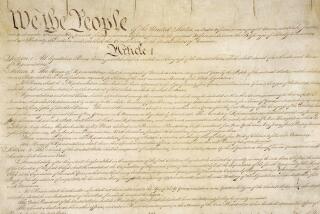Lawmaker Defends a Curb on the Courts
- Share via
Re “A Bonehead on History,” editorial, Sept. 21: I believe The Times’ editors, had they read the resolution as amended by the House Constitution subcommittee on May 13, might have thought twice before resorting to name-calling. The language of the Feeney/Goodlatte resolution actually encourages references to foreign philosophers or statesmen when they help inform an understanding of the Constitution’s original meaning.
I would like to answer your question: “What is the foundation for United States law?” The answer is, of course, the rule of law. When the Constitution was written, our founders asserted our authority as a sovereign people in the Preamble. Yes, our founders used models of different governments to create the great system we have today. However, when they wrote the Constitution it was created to be the supreme law of the land. This document established our three branches of government, gave them limited powers, and was itself a limit on the power of government. The founders purposely made this document difficult to amend and specified limits on treaty-making with foreign nations. Why go to this extent? To protect our sovereignty.
In contrast, Supreme Court Justice Sandra Day O’Connor has stated: “I suspect that over time [the U.S. Supreme Court] will rely increasingly ... on international and foreign courts in examining domestic issues.” Indeed last year, the Supreme Court relied on the European Court of Human Rights in interpreting the intent of the 14th Amendment. And, Justice Stephen Breyer looked to the Supreme Court of Zimbabwe to interpret the reach of the 8th Amendment. Zimbabwe!? That country is universally recognized as one of the most repressive on the planet. If the courts decide to write these “buffet style” judicial opinions, where will they draw the line? Will they use the laws of any country, such as China or North Korea?
The 74 cosponsors of the Feeney/Goodlatte resolution seek to preserve the sovereignty of the U.S. Americans should not be ruled by foreign court decisions. If The Times believes that this makes us “boneheads,” then I’m sure there will be many that join the Bonehead Caucus.
Rep. Tom Feeney
R-Fla.
More to Read
Get the L.A. Times Politics newsletter
Deeply reported insights into legislation, politics and policy from Sacramento, Washington and beyond. In your inbox twice per week.
You may occasionally receive promotional content from the Los Angeles Times.








